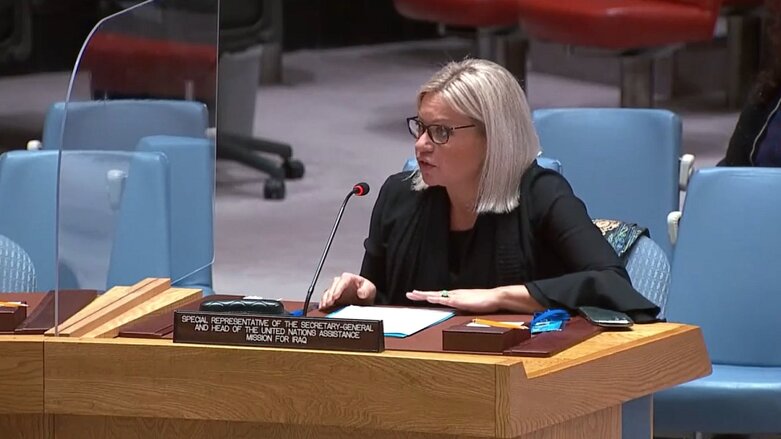UN envoy denounces attack on Zakho at Security Council meeting

WASHINGTON DC (Kurdistan 24) – Addressing the UN Security Council on Tuesday, the Special Representative of the UN Secretary-General for Iraq, Jeanine Hennis-Plasschaert, condemned the July 20 artillery attack on Zakho that killed nine Iraqi Arab tourists visiting the Kurdistan Region.
In her statement, Hennis-Plasschaert detailed the “horrific attack” and described in considerable detail Baghdad’s response. As she made clear, Baghdad holds Turkey responsible.
For its part, Turkey has denied any responsibility, and Hennis-Plasschaert noted that both countries, Iraq and Turkey, are prepared to carry out a joint investigation.
She concluded her lengthy statement by affirming, “It is of the greatest importance that all attacks on Iraqi territory cease,” as “such aggression not only recklessly heightens national and regional tensions” but also causes “grave human tragedies.”
The Attack On Zakho
“In the early afternoon of July 20,” Hennis-Plasschaert said, “five rounds of artillery struck Parkha (Parkhe) resort,” which is “a well-known tourist destination.” Given the weather and the season, the resort was “packed with visitors.”
The first artillery round “hit an unpopulated hillside overlooking Parkha,” she explained. The following four rounds hit the center of the resort, killing nine people, including three children, the youngest of whom was just one year old. The attack injured another 33 others, eleven of whom had to undergo surgery, while three remain in critical condition.
Iraqi Response
Immediately after the attack, Hennis-Plasschaert explained, Iraqi Prime Minister Mustafa Al-Kadhimi established a committee that visited the site that same day. It collected evidence and spoke with witnesses and local authorities.
Based on that investigative work, the Iraqi government, “in the clearest of terms, attributed the tragic events to Turkish armed forces,” she said.
Turkey responded with a press release that day, denying responsibility. The PKK (Kurdistan Workers’ Party) also issued a statement denying that it had any presence in the area while blaming Turkey for the attack.
In addition, Iraq’s National Security Council later met on July 20 for an emergency session. It “strongly condemned the ‘Turkish attack,’” Hennis-Plasschaert stated, quoting from the National Security Council’s statement to make clear that was the Council’s language describing the attack.
The Council also directed the Iraqi Foreign Minister, Fuad Hussein, to prepare a file on the “repeated Turkish attacks against Iraq,” while it told him to summon the Turkish ambassador to protest the assault and recall Iraq’s Charge d’Affaires in Ankara.
The following day, July 21, as Hennis-Plasschaert continued her narrative, “Iraqi leaders from across the political spectrum” issued a “joint statement condemning the ‘Turkish attack’” and supporting the Foreign Ministry’s stated intention to bring the issue before the UN Security Council.
On July 23, the Prime Minister of the Kurdistan Regional Government (KRG), Masrour Barzani, visited Baghdad and met with Kadhimi. The two leaders then issued a joint statement in which they “expressed their ‘strong condemnation of the Turkish aggressions on Iraqi territory.’”
Also, on July 23, the Foreign and Defense Ministers, as well as the Army Chief of Staff and Deputy Commander of Joint Operations, addressed the Iraqi parliament. As Foreign Minister Hussein told the Iraqi MPs, “over 22,700 Turkish violations of Iraqi sovereignty had been recorded since 2018,” while “the Foreign Ministry had submitted 296 memoranda of protest against Turkish ‘interference’ since 2018,” Hennis-Plasschaert told the Security Council.
She also explained that the National Assembly’s Security and Defense Committee had “recommended the expulsion of PKK elements from Iraq, the withdrawal of all Turkish forces,” and “the redeployment of federal forces along the border with Turkey.”
“In essence,” as Hennis-Plasschaert summarized Baghdad’s position, “Iraq demands that Turkey withdraws its forces from all Iraqi lands and calls for an investigation.”
Condemns Aggression Against Iraq
Hennis-Plasschaert concluded her presentation to the Security Council with strong condemnation of the repeated aggressions against Iraq.
“As I have said many times in past years,” she said, “Iraq rightfully rejects the notion that it can be treated as an arena for external and regional rivalries—as an arena where neighbors, and any other actor for that matter, routinely, and with impunity violate its sovereignty and territorial integrity.”
“It is of the greatest importance that all attacks on Iraqi territory cease,” she affirmed.
